
14 Lessons I Learned After 34 Years Of Lifting
Here's what a 55-year-old still-trying-to-be-a-bodybuilder can teach you.
A lot has changed since my senior year at Occidental College in Los Angeles. The year was 1981. Ronald Reagan was president, MTV launched on cable television, and "Raiders of the Lost Ark" instantly became one of my favorite movies. The virus that causes AIDS was identified, which had a huge impact on me because I would lose so many close friends to it over the years.
Something else happened that year. At 170 pounds, I picked up my first weight.
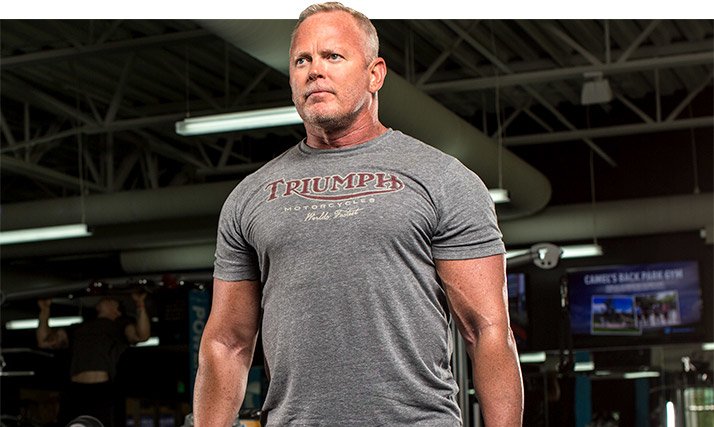
Whatever your motivation for getting started with bodybuilding, it will likely change a lot as you age. Most people drop out along the way; you can tell by fact that a majority of the people you see in the gym are in their 20s and 30s. Many lifters are forced to stop due to the injuries that occur over time. God didn't design the human body to lift heavy weights over and over again for three decades.
In spite of—or perhaps because of—injuries, I learned a number of lessons along the way. This article won't help you get a better bench press, but you might gain some valuable perspective from my 55-year-old body.
1Warm-Ups Aren't Optional
Before even touching the iron these days, I spend five minutes on the recumbent bike while doing arm circles, overhead presses, arm swings, front raises, triceps extensions, and shoulder circles with no weights, all to get those areas warmed up. If I skip this phase, I'll have to spend twice as long doing warm-up sets anyhow, so I now just automatically start on the bike, and the blood circulation helps with the minor aches and pains that are a part of daily life now.
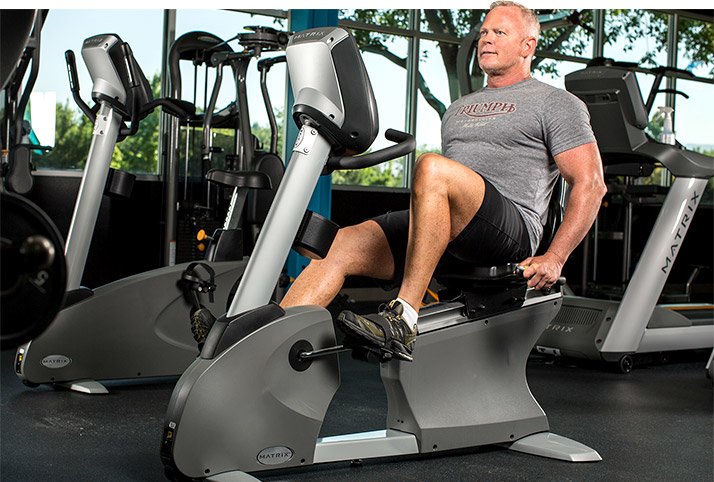
All the advice you've heard about the importance of warming up before doing your working weights becomes even more necessary as you age. I address some of those same issues post-workout with stretches for key muscles groups as well, especially the hamstrings and lower back.
2I Wish I'd Done Deadlifts Earlier
When I started lifting in the early '80s, not a lot of guys were doing deadlifts. We were surely into mirror muscles, so I never bothered to learn how to deadlift either. In the "wish I knew then what I know now" department, it's clearly one of the best mass and strength moves you can do, and with all the musculature it works it provides a nice hormonal boost.
Today, lots of younger guys are doing deadlifts at the gym, but all too often they're mistaking the Romanian variety for the regular deadlift, and that version doesn't count. Know your deadlift and do it right.
3Training Hard May Not Overcome Average Genetics
I remember this guy who sat in front of me in ninth grade. One time, he flexed his arm, and it swelled up into a nice ball. I can tell you that after 34 years of training, I still don't have the nice biceps peak he had as a 14-year-old.
No matter how badly you might want something or how hard you train, achieving some physical traits might be out of your reach. You just can't compare yourself to others; everyone is dealt a different genetic hand, and you can only focus on improving yours.
4I Can Take A Day Off If I Want To...
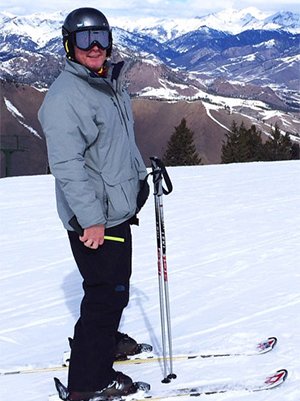
I used to be pretty obsessive about not missing workouts—heck, I had a hard time even taking vacations. Now, if I don't feel like going to the gym, I don't. I'm not nearly as hard on myself for missing workouts, but I still try to get some form of exercise every day, whether it's outdoor cardio or just gardening.
The biggest problem when missing a workout is that it's also easy to miss a second, and then a third. And like anybody else, once I'm out of my groove, it's much harder to get it back—and I don't feel as good about myself.
5Results Don't Happen Overnight
Math can be a cruel subject. I put about 4 inches on my arms in all those years, probably half to the biceps and half to the triceps. It took me about 10 years to hit my max size. If I worked biceps once a week for 52 weeks, I netted a discouraging 0.004 inches per workout.
You're not going to get anywhere overnight, so your drive had better be tempered with patience. FYI, I put on about 60 pounds of body weight during that time, which only comes out to about 6 pounds a year.
6I Should Have Kept My Neck Neutral When Shrugging
You might skim over most form pointers in exercise articles, but when it comes to your spine, pay undivided attention. In my case, I had a tendency to look down when I was doing heavy shrugs—which I find is common with many trainers today. I typically had 100-pound dumbbells in my hands, a weight that pulls on your neck because the weight goes right through your shoulders and traps. When your head tilts, your cervical spine is out of its natural alignment. Combine this with heavy weights and you're in the perfect position to herniate a disc.
That's exactly what happened to me. My right arm went completely numb for two weeks, and my right-side pec and triceps lost all innervation and completely atrophied. I could bench a 100-pound dumbbell with my left side and could barely press 20 with my right! I underwent years of conservative medical treatment before finally having neck surgery.
All of this from shrugging with my head down.
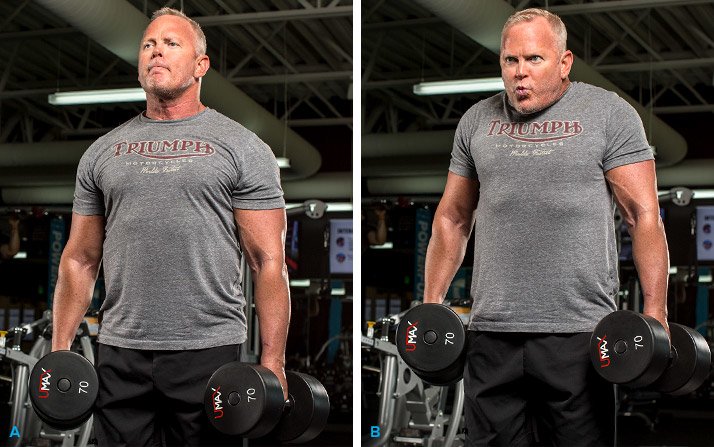
Dumbbell Shrug
7
I Keep My Workouts Shorter
I look back and wonder how I did two-hour workouts six days a week. I still can't figure out how I survived—I was probably oozing cortisol out of my ears. My limit today is about 75 minutes, which allows me to hit it hard in the gym, but leaves me physically and mentally ready to head home when I'm done.
After 34 years of hard training, I'm not going to be building mass at this point—it's more about trying to hold on to what I've got. Even then, the thrill is in pushing myself hard and the satisfaction of knowing I can keep up with many guys half my age.
8Don't Mess With Nerve Injuries
There are aches and pains, there are tears and strains, and then there are injuries so serious you experience numbness. Numbness may indicate a serious problem, such as a pinched disc or a disc that's bulging in your spinal column. Any time you feel numbness in a limb, and it doesn't go away, see a sports-medicine physician.
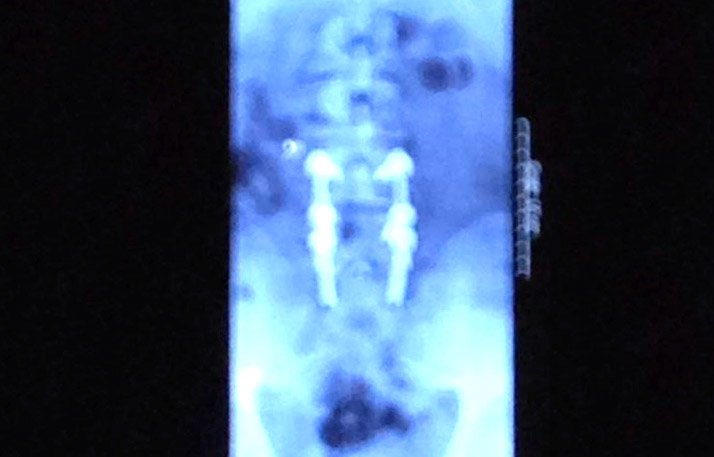
Some nerve injuries improve with time; others are progressive and just get worse until you have to undergo a six-figure medical procedure. This is the most serious type of injury a lifter can suffer—and you may not even feel any pain. Don't ignore the symptoms.
9Everything Feels Heavier
It's amazing how weights I used to warm up with now feel heavy. I've cut back on the intensity of my workouts, partly out of necessity (sore joints), but also because strength and testosterone levels naturally decline with age—something I tried to fight for so many years but now accept as inevitable.
Higher-rep sets are far kinder to the body, and you learn not to care anymore about what the guy working out next to you thinks.
10Don't Put All Your Eggs in One Basket
I've worked in this industry for about two decades, and it's amazing how many guys I've met whose singular goal was to become as muscular as possible. What bothers me the most is when that goal supersedes everything else in their lives, including careers and family.
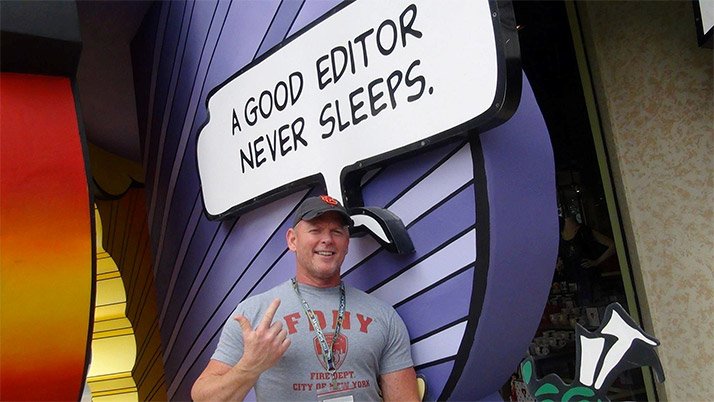
I realize that size makes you more attractive to some people, and that can be very motivating, but it's not going to put food on the table when you're in your 40s and 50s. Bodybuilding by its very nature is an obsessive activity, but striving for balance makes you a well-rounded individual. And you won't be able to hold on to that body forever.
11Big Muscles = Big Neck = Big Risk for Obstructive Sleep Apnea
Going from 170 to 230 pounds over about 10 years means more than having to buy new clothes every so often. Little did I know that, as I gained weight, I was concurrently developing a weakness that made life miserable.
Obstructive sleep apnea and bodybuilding can go hand in hand, because OSA plagues big guys with big necks (over about 17 inches) and it gets worse as you get older. I was constantly dozing off in staff meetings 20 years ago—nobody even knew what OSA was back then—and relied on stimulants to keep me awake and boost my energy for workouts. I finally got tested and found that I wasn't just snoring—I stopped breathing countless times every hour during the night, never falling into a restful sleep.
While I use a CPAP machine now and feel far better, most men don't even know they have the problem—but their partner may well be aware of it.
12Cut Down on Pre-Workouts
I have a little less energy now that I'm in my 50s, especially after a long day at work. When I was younger, I might just take a scoop of a pre-workout supplement to boost my energy or drive through a hard workout, but I'm less inclined to do so today. I may opt for a cup of coffee instead, or just a third of a scoop when I want a kick in the butt.
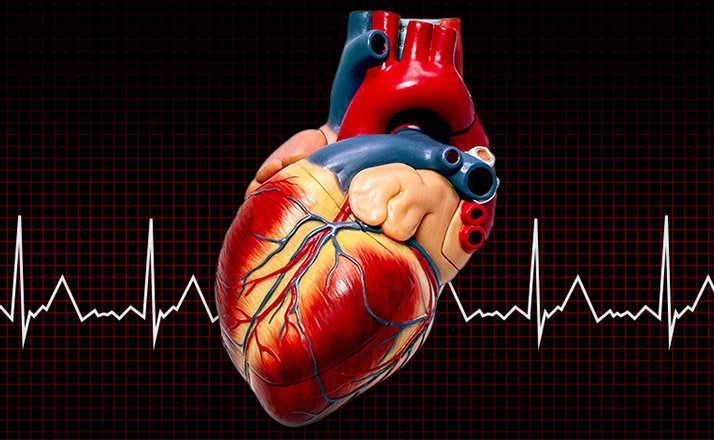
Read product labels carefully, especially if you're in your 50s. Your heart's not as young as it used to be, and some combinations of ingredients aren't recommended at full dosage.
13Age Means You'll Have Greater Trouble Losing Weight
I used to be able to lose 5-6 pounds over a weekend of partying, but not anymore. For one thing, there are fewer of those weekends now because they simply take too many days to recover from. Also, I can't seem to get the weight off as easily anymore.
I want to lose about 20 pounds, both for my back health and to treat the sleep apnea, a condition that improves when you lose weight. But it's not so easy to drop those pounds any more. I've definitely cut back on lots of nutrient-dense foods, but with a slowed metabolism and a less-active life, it's become a real battle to lose weight. I'm still trying, though.
14Train for Health Over Vanity
Most guys like me take up bodybuilding for selfish reasons: We want to look good and enjoy all the benefits that come with that. Health? That's way down on the list. Alas, with time our priorities change, and if they don't, there's a heavy price to be paid. Far too many bodybuilders have checked out far too early.
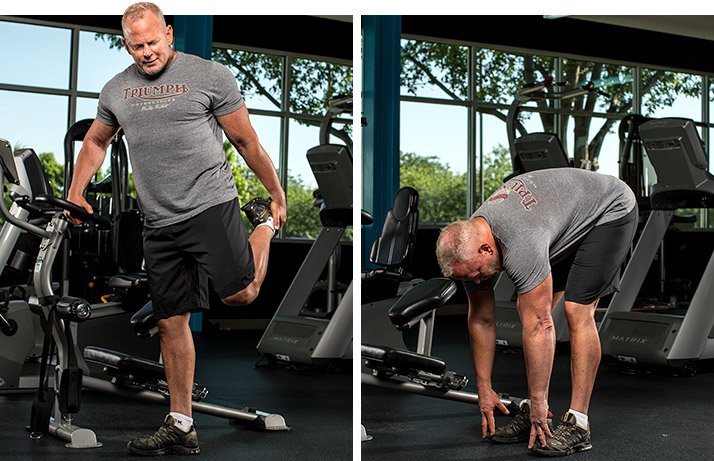
Being fit and healthy is now more important to me than having a 20-inch arm. (Heresy, right?) So I warm-up well beforehand, stretch afterward, perform rotator-cuff exercises, do cardio for my heart—things many younger lifters would never bother with.
Middle age may seem like it's a long way off, but it comes along faster than you expect it to. Treat your body right today, and it'll treat you right for decades to come.
